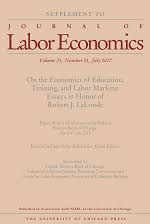
Bijkerk, S., \Dominguez Martinez\, S., Kamphorst, J. and Swank, O. (2021). Labor Market Quotas when Promotions are Signals Journal of Labor Economics, 39(2):437--460.
-
Affiliated authors
-
Publication year2021
-
JournalJournal of Labor Economics
We analyze the consequences of labor market quotas for the wages of women in high-level positions. Labor market quotas create uncertainty about the reason a woman is promoted. Firms know whether they promoted female employees because of the quota or their ability; their competitors do not. A winner{\textquoteright}s curse, reducing competition for women in high-level positions, results. This widens the gender pay gap for these women. Ex ante, women are better off without quotas. Next we investigate how quotas affect incentives for employers to learn women{\textquoteright}s abilities to make better job assignment decisions. Then, under specific conditions women may benefit.